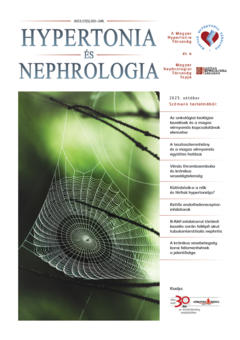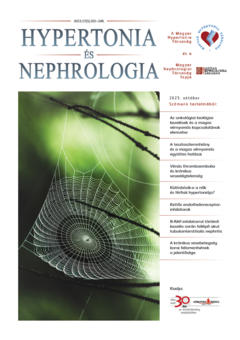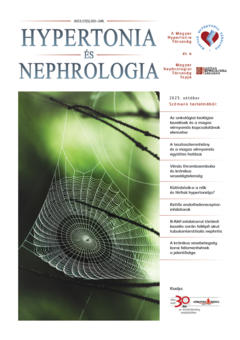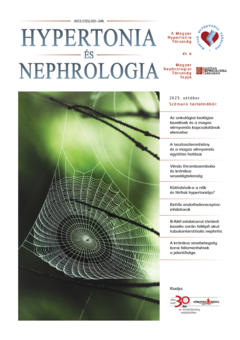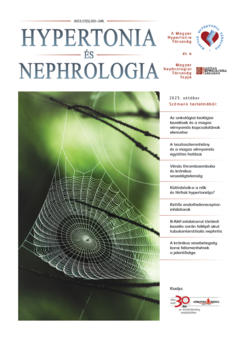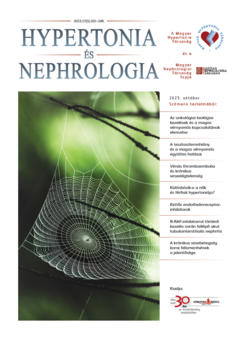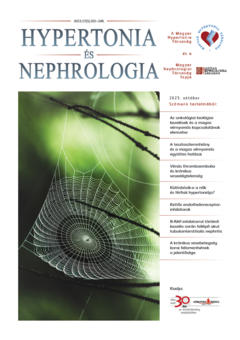The eLitMed.hu medical portal uses computer cookies for convenient operation. Detailed information can be found in the Cookie-policy.
Hypertension and nephrology - 2023;27(05)
Content
[Analysis of the relationship of oncological biological treatments and high blood pressure]
[Biological drugs-combined chemotherapy represents a real breakthrough in the effective treatment of locally advanced and metastatic cancer patients. One of the most common and clinically significant side effects of angiogenesis inhibition is the development of high blood pressure. The purpose of this review is to analyze the relationship between inhibitors of the vascular endothelial growth factor signaling pathway and hypertension. We review incidence of VEGF/VEGFR inhibitors induced hypertension, mechanisms of its development, importance of blood pressure values regular monitoring, possible treatment strategies, and effectiveness of prophylactic antihypertensive treatment. We compare the results of clinical studies to clarify the prognostic and predictive significance of blood pressure elevation during antiangiogenic treatment. Further research into the relationship between biological treatment and hypertension may lead to more effective treatment with longer survival and better quality of life in advanced cancer patients.]
[High blood pressure and low testosterone levels both increase the risk of cardiovascular disease and alter the morphology and function of blood vessels]
[Both hypertension and andropause alone increase the risk of cardiovascular disease. The incidence of both diseases increases with age. As a consequence they may often present concurrently in men. The damaging effects of the two noxae may add up - this may be observed in the remodeling processes of coronary resistance vessels. This mini-review summarizes the effects of hipertension, testosterone deficiency and the combined effects of these two noxae on the morphological, biomechanical and functional adaptation of coronary resistance vessels, as well as on cardiovascular diseases.]
[Chronic kidney disease and venous thromboembolic events]
[Our aim is to analyse venous thromboembolic events regarding chronic kidney disease. Based upon epidemiologic data, both thromboembolic and haemorrhagic events are more frequent among patients with chronic kidney disease. Changes in levels of coagulant factors, thrombocyte and endothel disfunction, uremic toxins and dialysis related issues share role in pathogenesis. Guidelines lack of adequate information regarding this specific patient group. Therapeutic shift can be observed from vitamin K antagontists toward direct oral anticoagulants, not only in general population but also in CKD patients, with special interest in apixaban. Another therapeutic trend is change from unfractioned heparin to low molecular weigh heparins with anti Xa level monitoring among CKD population. Special attention is needed for thrombotic events related to eritropoietin therapy and hemodialysis access.]
[Is hypertension different for women and men?]
[Hypertension is a risk factor for cardiovascular diseases in both men and women. Lifelong studies have proven that women suffer from high blood pressure in old age more often than men and this is often associated with obesity, dyslipidemia, and diabetes. All of this can most likely be related to menopause, when one of the most important female sex hormones, estrogen’s vascular protective and anti-inflammatory effect ceases. It has also been proven that pregnancy is also a test for the vascular system. Pathological abnormalities during pregnancy increase the cardiovascular risk later on. Differences can be detected in the regulation of blood pressure, as a result of the autonomic nervous system and hormonal effects. Differences can also be discovered in relation to common cardiovascular diseases. Although the recommendations do not currently differentiate, the effectiveness of the therapies and the frequency of side effects may also differ. Recent researches conclude that women’s cardiovascular risk is manifested in lower blood pressure values than men’s. It is possible that we should modify the threshold and target values of women’s blood pressure in order to decrease the proven cardiovascular risk of high blood pressure in women through well-planned therapy.]
[Double endothelin receptor inhibitors]
[A common problem in the hypertension care is the treatment of cases that react difficultly to treatment, including resistant hypertension. The structure of the treatment is particularly challenging. Intensive research is underway in the field of developing new drugs that can be used in the treatment of resistant hypertension, one possibility being dual endothelin receptor inhibitors. In my article, based on the results of the recently published PRECISION study, I present the possible use of the drug group in this area.]
[Acute tubulointerstitial nephritis occurring during treatment with a B-RAF inhibitor in a patient with colorectal adenocarcinoma]
[With the expansion of targeted biological treatments in oncology and the improvement in life expectancies, it is increasingly common to consider the long-term and short-term effects of anti-tumor agents on the kidneys, which significantly influence patient mortality and future oncological treatment options. B-RAF inhibitors are widely used, primarily in cases of malignant melanoma and colorectal cancers. We present the case of a young patient with colorectal adenocarcinoma treated with B-RAF (v-Raf murine sarcoma viral oncogene homolog B) and EGFR (epidermal growth factor) inhibitors as second line agents. During treatment, acute renal failure developed, necessitating hemodialysis. Renal biopsy confirmed acute tubulointerstitial nephritis, and we suspected the nephrotoxic effect of the B-RAF inhibitor as the underlying cause. Steroid treatment was initiated, but unfortunately, we lost the patient due to rapid progression of the malignant disease.]
[The importance of early detection of chronic kidney disease]
[The number of patients affected by chronic kidney disease (CKD) is continuously increasing worldwide. It can be present in 1 out of every 10 adults. The prevalence of CKD is over 25% among individuals with diabetes and 26.1% among individuals with hypertension. Unfortunately, due to the late onset of symptoms, the diagnosis of earlier stages of CKD is low. The lack of recognition of stage 3 CKD in patients without comorbidities ranges from 65.0% to 97.1%. In case of comorbidities, the lack of recognition ranges from 47.5% to 94.6%. Screening for CKD, early recognition, and initiating treatment in the early stages can improve kidney function or at least slow down the progression of CKD.]
1.
Clinical Neuroscience
Is there any difference in mortality rates of atrial fibrillation detected before or after ischemic stroke?2.
Clinical Neuroscience
Factors influencing the level of stigma in Parkinson’s disease in western Turkey3.
Clinical Neuroscience
Neuropathic pain and mood disorders in earthquake survivors with peripheral nerve injuries4.
Journal of Nursing Theory and Practice
[Correlations of Sarcopenia, Frailty, Falls and Social Isolation – A Literature Review in the Light of Swedish Statistics]5.
Clinical Neuroscience
[Comparison of pain intensity measurements among patients with low-back pain]1.
Clinical Neuroscience Proceedings
[A Magyar Stroke Társaság XVIII. Kongresszusa és a Magyar Neuroszonológiai Társaság XV. Konferenciája. Absztraktfüzet]2.
3.
Journal of Nursing Theory and Practice
[A selection of the entries submitted to the literary contest "Honorable mission: the joys and challenges of our profession" ]4.
Journal of Nursing Theory and Practice
[End of Life and Palliative Care of Newborns in the Nursing Context]5.
Journal of Nursing Theory and Practice
[Aspects of Occupational Health Nursing for Incurable Patients ]